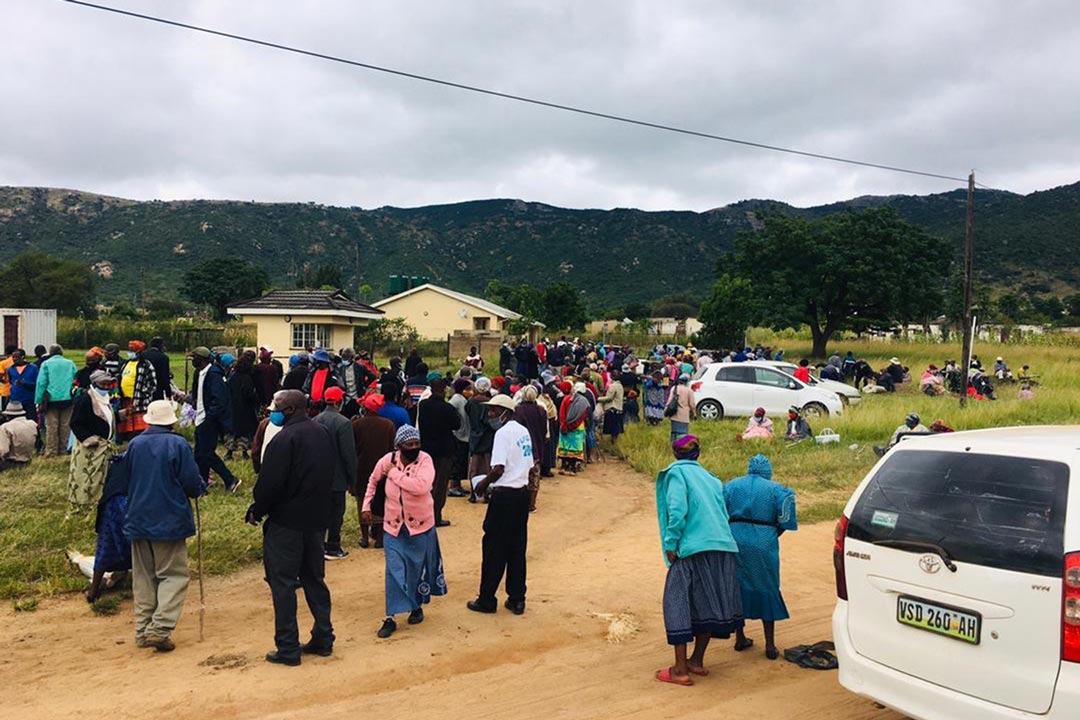“I can only run away from death for so long”: Vaccinating Elders in Eswatini
The delivery of COVID-19 vaccines to Eswatini through COVAX means the elderly now have the chance to protect themselves against the disease. VaccinesWork visits a vaccination session in Lobamba.
- 14 April 2021
- 4 min read
- by Zanta Nkumane

The hive of activity begins just before 7am, as the first few elderly people shuffle into a queue for their vaccination at Lobamba in the western part of Eswatini. Lobamba is the legislative, traditional and spiritual capital and also the seat of the country’s parliament.
The government has provided on-site registration for the elderly who do not have access to smartphones and can’t register online. This registration is conducted prior to vaccination.
As the morning begins to stretch into the day, the numbers swell and the line elongates past the gate, the sun beating down on them as the hours roll on.
One would expect a blanket of gloom and pandemic fatigue to hover, but the air is filled with chatter and laughter, as peers finally have a chance to reconnect after months of not seeing each other. As a high risk demographic, many of the elderly in Eswatini have followed a stringent lockdown to avoid contracting COVID-19.
Gogo Busisiwe Gama, 62, says that, despite the lengthy wait, the process was seamless and she was home earlier than she expected.
“The young people working there were fast,” she says of the healthcare workers administering the vaccine at the Lobamba constituency. She was one of the first to arrive. With the help of her grandchildren, she was able to register on the link provided by the government on her phone.
“I just let the kids do it for me because I don’t know these things,”
Have you read?
The link directs you to a site where potential vaccinees pre-register with their full details, including underlying co-morbidities where applicable. This is for the government’s vaccination database but is also designed to accelerate the process on-site, so one can just walk in instead of waiting in line.
Those of us who had registered before were able to get vaccinated first,
Gogo Gama says.
The government has provided on-site registration for the elderly who do not have access to smartphones and can’t register online. This registration is conducted prior to vaccination.
Gama’s four children all contracted the virus and she was unable to see them because of her age. But she considers herself lucky to be alive because she lives with one of the children who had the virus, “It was painful because I couldn’t help any of them,” she says.
Despite the anxieties surrounding the vaccine, Gama says she just felt tired with a minor headache a day after being vaccinated. Dr Bongani Chirigo, one of the frontline doctors, says that besides being high risk, another motivation to vaccinate was to “alleviate the anxiety amongst others who were worried about the vaccine.”
Having health workers who are vaccinated certainly helps alleviate many of the elderly’s fears. Gogo Thulina Fakudze, 74, who had not pre-registered online as she doesn’t have a smartphone, had a longer wait compared to Gogo Gama. She had to be registered on-site before being allowed to proceed inside.
“I waited a long time but, once I was inside, they helped me quickly,” she says. The Chief organised for more chairs sourced from the National Church just down the road, since the numbers surpassed the projected expectations – nearly 250 elderly showed up.
Fakudze says she rushed to secure a vaccination because she lost too many relatives and friends to COVID-19. Her biggest hurt was the inability to bury her loved ones.
“I can only run away from death for so long because too many people are dying. I want the vaccination to protect myself,” she says. The day after vaccination, Fakudze said she felt perfectly healthy with no side effects.
Dr Chirigo praised the vaccination roll-out programme, under the auspices of the COVAX initiative, because he felt the government ensured accessibility for the elderly and the publicity was abundant across many platforms.
“I hope the government can improve on pre-vaccination counselling because when people face unexpected side effects in the first dose, they might not encourage others to come back for second dose,” he says.
As the country continues the first phase of their vaccination roll-out programme, directed at the high-risk demographic of health workers and the elderly, its clear technology has a role to play in improving the efficiency of the process. The sights at the different vaccination sites show that, despite the bureaucratic admin and long lines, this is a small joy for the elderly. It marks what feels like a return to normalcy.





